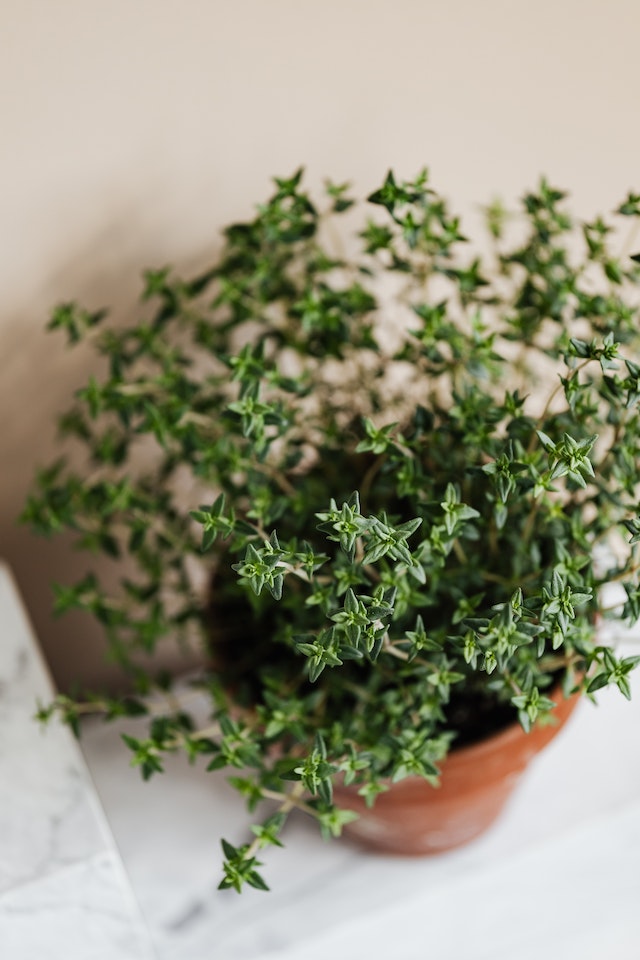Materia Medica: Thyme (Thymus vulgaris)
Disclaimer: This Materia Medica is provided for informational purposes only and should not replace professional medical advice. Please consult with a qualified healthcare practitioner or herbalist before using any herbal remedies.
Introduction: Thyme (Thymus vulgaris) is a versatile and highly regarded herb in traditional herbal medicine. As a professional herbalist, I have prepared this comprehensive Materia Medica to provide an exhaustive overview of thyme’s medicinal properties, traditional uses, dosage, and safety considerations.
Botanical Description:
- Family: Lamiaceae (Mint family)
- Genus: Thymus
- Species: Thymus vulgaris
Botanical Characteristics:
- Thyme is a low-growing perennial herb with small, fragrant leaves and tiny pink or purple flowers.
- It typically reaches a height of 6 to 12 inches.
- The leaves are opposite, lance-shaped, and covered in fine hairs.
- Thyme has a strong, aromatic scent and a warm, slightly pungent taste.
Traditional Uses and Medicinal Properties:
- Antimicrobial Properties:
- Thyme is renowned for its powerful antimicrobial properties. It has been traditionally used to treat respiratory infections, such as coughs, colds, and bronchitis.
- Thyme’s essential oil contains thymol, which is effective against various bacteria and fungi.
- Respiratory Health:
- Thyme acts as an expectorant, helping to loosen and expel mucus from the respiratory tract.
- It can alleviate symptoms of asthma, sore throat, and sinusitis.
- Digestive Aid:
- Thyme stimulates digestion and relieves indigestion, bloating, and gas.
- It can be used as a digestive tonic after meals.
- Immune Support:
- Thyme boosts the immune system due to its high antioxidant content.
- It may help prevent and alleviate common illnesses.
- Antispasmodic:
- Thyme can ease muscle spasms and cramps, making it useful for menstrual pain and digestive discomfort.
- Anti-Inflammatory:
- It possesses anti-inflammatory properties that can be beneficial for conditions like arthritis and joint pain.
- Antioxidant:
- Thyme contains antioxidants that protect cells from oxidative damage, reducing the risk of chronic diseases.
- Topical Uses:
- Thyme-infused oil or cream can be applied topically for skin issues, such as acne and fungal infections.
Dosage and Preparations:
- Infusion: Steep 1-2 teaspoons of dried thyme leaves in 1 cup of hot water for 10-15 minutes. Drink up to three times daily.
- Tincture: Take 2-4 ml of thyme tincture three times daily.
- Essential Oil: For aromatherapy or topical use, dilute 2-3 drops of thyme essential oil in a carrier oil.
Safety Considerations:
- Thyme is generally considered safe when used in recommended amounts for short periods.
- Avoid thyme if you are pregnant or breastfeeding.
- Allergic reactions are rare but possible; discontinue use if any adverse reactions occur.
- Thyme oil should always be diluted before topical application.
- Consult a healthcare professional before using thyme if you have any underlying medical conditions or are taking medications.
Conclusion: Thyme, with its wide-ranging medicinal properties, has been valued by herbalists and traditional healers for centuries. Whether used to combat respiratory ailments, support digestion, or promote overall health, thyme is a valuable addition to any herbal medicine cabinet. However, as with any herbal remedy, it is essential to use it responsibly and seek professional advice when needed.






One comment on “Thyme: Herbal Plant Profile”